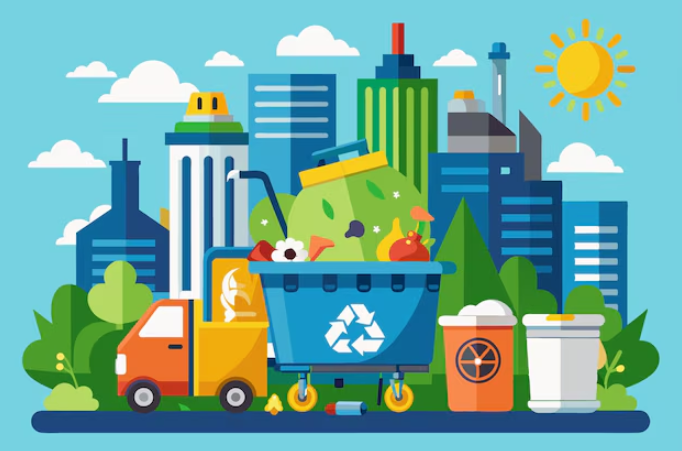Every action in the battle against climate change matters. Effective waste management is a sometimes disregarded yet very effective approach to reduce carbon emissions. People and companies can make a difference by searching for a “waste management company near me” that stresses environmentally friendly operations, in addition to large-scale regulations and corporate sustainability programs, which are important. This article investigates how local waste management businesses support environmental sustainability and reduce carbon footprints.
How Waste Contributes to Carbon Emissions
Waste creation and disposal significantly increase greenhouse gas emissions. Improperly handled waste often goes to landfills. There, it breaks down and produces methane. This gas is much stronger than carbon dioxide and contributes to climate change. Moving and burning waste raises carbon emissions as well. Waste management firms can help lower these environmental consequences by means of effective waste collecting, sorting, recycling, and disposal.
How Local Waste Management Companies Help Reduce Carbon Emissions
1. Waste Collection & Transportation
Local waste management firms maximise collection routes. This lowers fuel use and emissions from waste vehicles. Many businesses are switching to electric or fuel-efficient vehicles, which helps reduce their carbon footprints. Effective management tools help waste managers ensure vehicles take the best routes. Furthermore, better waste collection planning can help lower the frequency of visits, optimizing the whole process for sustainability.
2. Recycling and Circular Economy
Recycling cuts carbon emissions and reduces the need for energy-heavy raw material extraction. A “waste management company near me” can manage recycling for paper, plastic, metal, and glass. These materials are then returned to the supply chain, which helps save energy when making new products. Recycling helps materials last longer, so we need less landfill space. This, in turn, cuts down methane emissions. Many municipal waste management groups work with manufacturers. They integrate recycled materials in production, lowering environmental impact.
3. Organic Waste
Like food, organic waste breaks down in landfills to create methane. Many times, local waste management businesses provide composting systems. These systems cut methane emissions and build nutrient-rich soil for farming. This helps support sustainability. Composting enhances soil quality which decreases dependency on synthetic fertilizers, contributing to their surroundings. Additionally, encouragement of homes and companies to apply composting methods helps control organic waste. This change turns waste from a problem into a valuable resource.
4. Help Businesses Reduce Waste
Effective waste management techniques can reduce much of the waste that businesses produce. Waste audits from local firms help businesses find areas to improve. These audits check what kind and how much waste is created. They also give specific advice to boost sustainability efforts. Working with local waste management companies helps businesses adopt zero-waste policies. They can teach staff proper waste disposal methods and encourage the use of recyclable or reusable items.
5. E-Waste Disposal
Hazardous materials included in electronic waste (e-waste) could endanger human health as well as its surroundings. Effective e-waste disposal helps prevent dangerous substances from polluting the environment and lowers the demand for new resources. Many waste management companies support responsible e-waste recycling. These projects recover valuable metals like copper, gold, and silver. They also give new life to old products. By recycling technology, we reduce the need for mining and protect the planet’s resources. When local managers divert e-waste from landfills, they lower carbon emissions and reduce pollution.
The Role of Education and Community Engagement
Many local businesses not only offer waste management solutions but also actively teach communities sustainable waste techniques. Holding seminars, starting educational initiatives, and working with companies and schools can help people adopt more sustainable habits. This cooperation boosts awareness of what proper waste management looks like. When this occurs, communities will begin to understand how waste impacts climate change.
Why Choose a Local Waste Management Company?
Selecting a “waste management company near me” not only boosts the local economy but also mitigates the environmental harm that long-distance waste transportation causes. Local businesses are more likely to recognize regional sustainability issues and apply customized solutions consistent with community objectives. Furthermore, smaller, locally owned waste management companies may prioritize customer care since they offer households and companies more adaptable and responsive waste solutions. Supporting local companies promotes economic development combined with environmental advantages by helping generate jobs in the community.
Conclusion
Reducing carbon emissions and creating g a sustainable future depends on waste management. Individuals and businesses may help lower their carbon footprint, improve recycling efforts, and support a circular economy by selecting a responsible and eco-conscious “waste management company near me”. By means of effective waste management strategies, recycling initiatives, composting, and sustainable disposal methods, these businesses contribute to reducing the environmental effect of waste, therefore improving the conditions of communities for the next generations.
The environment can be permanently improved by addressing waste at its source, changing disposal methods, and partnering with nearby waste management companies. The combined effort will greatly help reduce carbon emissions and protect natural resources for the future as more individuals and companies pledge to sustainable waste management.
